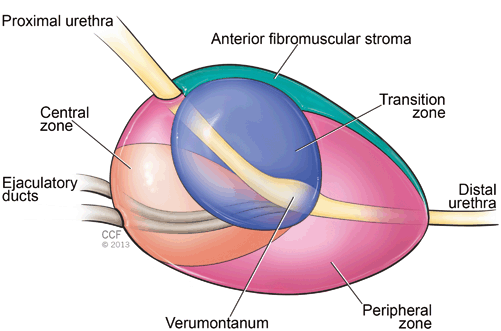Prostate Cancer Treatment
The prostate gland (the prostate) is an organ of the male reproductive system. It is about the size of a walnut and is found at the base of the bladder. The thin tube that allows urine and semen to pass out of the penis (the urethra) runs through the prostate gland. Alkaline fluid produced by the prostate gland helps to nourish sperm and leaves the urethra as ejaculate (semen). The prostate undergoes two main growth spurts. The first is fuelled by the sex hormones made by the testes during puberty. This prompts the prostate to reach an average weight of 20 grams. The second growth spurt begins when men are in their thirties.
Types of prostate disease
The three most common forms of prostate disease are inflammation (prostatitis), non-cancerous enlargement of the prostate (benign prostatic hyperplasia, or BPH) and prostate cancer. A man may experience one or more of these conditions.


Symptoms of prostate disease
In its earliest stages, prostate cancer may or may not be associated with symptoms. The symptoms of Prostate Cancer depends on the condition, but may include:
- difficulties urinating, such as trouble starting the flow of urine
- the urge to urinate often, particularly at night
- feeling as though the bladder can’t be fully emptied
- painful urination
- blood in the urine or blood coming from the urethra independent of urination.
Blood in the urine is often due to causes not related to the prostate. Always see your doctor specifically a urologist, if you find blood in your urine.
Diagnosis of prostate disease
Prostate disease is diagnosed using a variety of tests, including:
- physical examination, including digital rectal examination (DRE), where the doctor inserts a gloved finger into your rectum to check the size of your prostate
- blood test for prostate specific antigen (PSA test; discuss this with your doctor)
- mid-stream urine (MSU) tests to look for infection or blood in the urine
- ultrasound scans and urinary flow studies
- biopsies of the prostate.
Treatment for prostate cancer
Treatment for prostatitis may include antibacterial drugs and supportive treatments, depending on the type of prostatitis.
Treatment for BPH may include medications to relax the smooth muscle of the gland or to shrink the size of the prostate, and surgery to produce a permanently widened channel in the part of the urethra that passes through the prostate.
Treatment for prostate cancer is tailored to suit individual circumstances. The nature of the cancer, other health problems the person may have, and their wishes will all be taken into account.
Management approaches for prostate cancer include:
- active surveillance
- surgery – for example, prostatectomy (removal of the prostate)
- radiotherapy
- ablative treatments such as high-intensity focused ultrasound (HIFU) and NanoKnife®
- hormone treatment (androgen deprivation therapy)
- chemotherapy
- watchful waiting.
